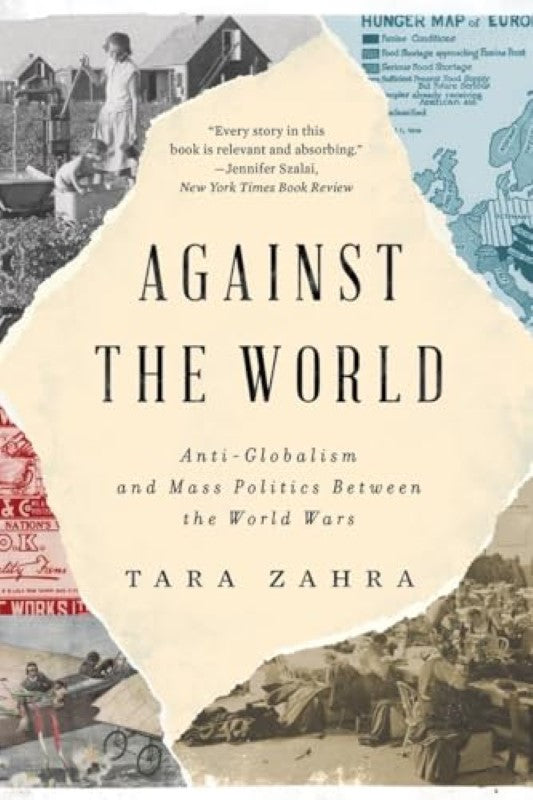Description
Explore the intricate web of history in 'Against the World,' a powerful exploration by renowned scholar Tara Zahra. This compelling narrative delves into the shift from internationalism to nationalism in the early twentieth century, capturing the pivotal events that shaped our modern world. Chronicling the era leading to the First World War, Zahra reveals how soaring enthusiasm for a borderless society met an equally strong reactionary tide. Travel, migration, and progressive reforms on women's rights were suddenly overshadowed by rising nationalism, as societal upheaval birthed demands for protectionism and cultural identity.
As Zahra examines the interplay between globalization and national identity, readers will discover how the economic crash of 1929 and subsequent Great Depression compelled nations to retreat into themselves, striving for food security and economic autonomy amidst growing anxieties about immigration and national borders. The book illustrates how the socio-political landscape shifted dramatically, leading to both the rise of democracies and dictatorships fueled by xenophobia and anti-Semitism, culminating in the devastating conflicts of the Second World War.
'Against the World' invites you to reflect on the ongoing struggles between global unity and national sovereignty, making it essential reading for those interested in history, politics, and social movements. With its thorough analysis and engaging prose, this book is a must-have for history enthusiasts.
Note: Shipping for this item is free. Please allow up to 6 weeks for delivery. Once your order is placed, it cannot be cancelled. Condition: BRAND NEW. ISBN: 9780393651966. Year: 2023. Publisher: W W Norton & Company.
Note: Shipping for this item is free. Please allow up to 6 weeks for delivery. Once your order is placed, it cannot be cancelled..
Condition: BRAND NEW
ISBN: 9780393651966
Year: 2023
Publisher: W W Norton & Company
Description:
Before the First World War, enthusiasm for a borderless world reached its height. International travel, migration, trade, and progressive projects on matters ranging from women's rights to world peace reached a crescendo. Yet in the same breath, an undercurrent of reaction was growing, one that would surge ahead with the outbreak of war and its aftermath.
In Against the World, a sweeping and ambitious work of history, acclaimed scholar Tara Zahra examines how nationalism, rather than internationalism, came to ensnare world politics in the early twentieth century. The air went out of the globalist balloon with the First World War as quotas were put on immigration and tariffs on trade, not only in the United States but across Europe, where war and disease led to mass societal upheaval. The "Spanish flu" heightened anxieties about porous national boundaries. The global impact of the 1929 economic crash and the Great Depression amplified a quest for food security in Europe and economic autonomy worldwide. Demands for relief from the instability and inequality linked to globalization forged democracies and dictatorships alike, from Gandhi's India to America's New Deal and Hitler's Third Reich. Immigration restrictions, racially constituted notions of citizenship, anti-Semitism, and violent outbursts of hatred of the "other" became the norm-coming to genocidal fruition in the Second World War.
Millions across the political spectrum sought refuge from the imagined and real threats of the global economy in ways strikingly reminiscent of our contemporary political moment: new movements emerged focused on homegrown and l
As Zahra examines the interplay between globalization and national identity, readers will discover how the economic crash of 1929 and subsequent Great Depression compelled nations to retreat into themselves, striving for food security and economic autonomy amidst growing anxieties about immigration and national borders. The book illustrates how the socio-political landscape shifted dramatically, leading to both the rise of democracies and dictatorships fueled by xenophobia and anti-Semitism, culminating in the devastating conflicts of the Second World War.
'Against the World' invites you to reflect on the ongoing struggles between global unity and national sovereignty, making it essential reading for those interested in history, politics, and social movements. With its thorough analysis and engaging prose, this book is a must-have for history enthusiasts.
Note: Shipping for this item is free. Please allow up to 6 weeks for delivery. Once your order is placed, it cannot be cancelled. Condition: BRAND NEW. ISBN: 9780393651966. Year: 2023. Publisher: W W Norton & Company.
Note: Shipping for this item is free. Please allow up to 6 weeks for delivery. Once your order is placed, it cannot be cancelled..
Condition: BRAND NEW
ISBN: 9780393651966
Year: 2023
Publisher: W W Norton & Company
Description:
Before the First World War, enthusiasm for a borderless world reached its height. International travel, migration, trade, and progressive projects on matters ranging from women's rights to world peace reached a crescendo. Yet in the same breath, an undercurrent of reaction was growing, one that would surge ahead with the outbreak of war and its aftermath.
In Against the World, a sweeping and ambitious work of history, acclaimed scholar Tara Zahra examines how nationalism, rather than internationalism, came to ensnare world politics in the early twentieth century. The air went out of the globalist balloon with the First World War as quotas were put on immigration and tariffs on trade, not only in the United States but across Europe, where war and disease led to mass societal upheaval. The "Spanish flu" heightened anxieties about porous national boundaries. The global impact of the 1929 economic crash and the Great Depression amplified a quest for food security in Europe and economic autonomy worldwide. Demands for relief from the instability and inequality linked to globalization forged democracies and dictatorships alike, from Gandhi's India to America's New Deal and Hitler's Third Reich. Immigration restrictions, racially constituted notions of citizenship, anti-Semitism, and violent outbursts of hatred of the "other" became the norm-coming to genocidal fruition in the Second World War.
Millions across the political spectrum sought refuge from the imagined and real threats of the global economy in ways strikingly reminiscent of our contemporary political moment: new movements emerged focused on homegrown and l

